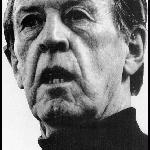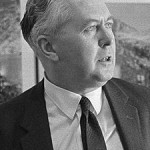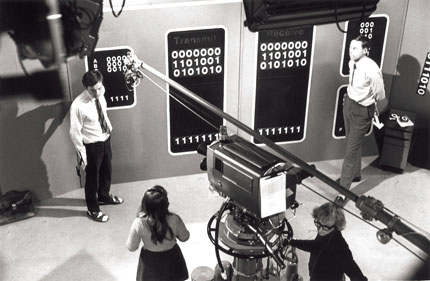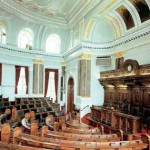The economics of The Open University
Monday, February 21st, 201121 February is the birthday of Leslie Wagner (here in black and yellow gown) formerly of the OU. When it first opened the economic efficiency of the OU was assessed. The OU produced data on a variety of aspects of the OU’s activities including how much it cost to produce a graduate, the cost to individuals and to the public sector. A study made in 1971 by an economist at the OU, Leslie Wagner, indicated that the OU was cheaper than other universities. The identification of fixed and variable costs, and deciding which costs ought to be allocated to teaching, which to research and which to ensuring that the university was also for the ‘storage of knowledge and maintenance of cultural standards’, was open to discussion. Wagner concluded:
When it first opened the economic efficiency of the OU was assessed. The OU produced data on a variety of aspects of the OU’s activities including how much it cost to produce a graduate, the cost to individuals and to the public sector. A study made in 1971 by an economist at the OU, Leslie Wagner, indicated that the OU was cheaper than other universities. The identification of fixed and variable costs, and deciding which costs ought to be allocated to teaching, which to research and which to ensuring that the university was also for the ‘storage of knowledge and maintenance of cultural standards’, was open to discussion. Wagner concluded:
It would be imprudent to draw any very definite conclusions from these figures. There are too many conceptual and statistical problems for that sort of exercise. Nevertheless, the gap between the Open University and the conventional universities’ figures is too large to be ignored
There were further studies, most of which largely agreed with Wagner’s assessment but in 1978 John Mace attacked the case that the OU was cheaper. He concluded that the idea that the OU ‘outperforms conventional universities in terms of openness and costs per graduate… is a dangerous myth. The studies suffer from serious methodological shortcomings’. The debate then took a turn towards another aspect of economics: output. To make a comparison in regard to attainment the same questions were set for students at the OU and for students at a conventional university. Overall, Lumsden and Alex Scott concluded, ‘the academic standards of the OU compare well with conventional universities’.
References:
Leslie Wagner, ‘The economics of the Open University’, Higher Education, 1, 2, May 1972, pp. 159-183;
Charles F Carter, ‘The economics of the Open University: a comment’, Higher Education, 2, !, February 1973, pp. 69-70
Bruce Laidlaw and Richard Layard, ‘Traditional versus Open University teaching methods: a cost comparison’, Higher education, 3, 4, 1974, pp. 439-467;
K. G. Lumsden and C. Ritchie, ‘The Open University: a survey and economic analysis’, Instructional Science 4, 1975, pp. 237-291;
Greville Rumble, ‘The economics of the Open University of the United Kingdom’, Open University mimeo, 1976
Leslie Wagner, ‘The economics of the Open University revisited’, Higher Education, 6 1977, pp. 359-381.
John Mace, ‘Mythology in the making: is the Open University really cost effective?’, Higher education, 7, 3, August 1978, pp. 295-309
Keith Lumsden and Alex Scott, ‘An output comparison of Open University and conventional students’, Higher Education, 11, 5, September 1982, pp. 573-591.






